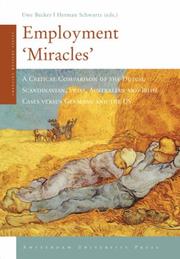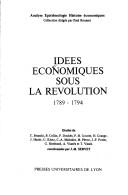| Listing 1 - 10 of 54 | << page >> |
Sort by
|
Book
ISBN: 9789289710527 Year: 2011 Publisher: Dublin European foundation for the improvement of living and working conditions
Abstract | Keywords | Export | Availability | Bookmark
 Loading...
Loading...Choose an application
- Reference Manager
- EndNote
- RefWorks (Direct export to RefWorks)
Structural change is a general characteristic of economic development, driven by shifts in relative productivity and demand, technological or socio- economic changes. To adapt to a changing economic environment, companies undergo restructuring to maintain or improve their competitiveness and, hence, sustainability. While restructuring is essential to the dynamism of the European economy, it can entail difficulties for employees. The ERM annual report 2011 looks at the whole range of instruments available in the EU to mitigate the negative effects that it may have for both companies and employees and introduces around 400 of them in an online database. The ERM annual report also presents an overview and analysis of restructuring activities in Europe as captured by the European Restructuring Monitor (ERM)
Public administration --- European Union --- 467.2 Economisch herstructureringsbeleid
Book
ISBN: 9780262034623 026203462X 0262333430 0262333449 0262333457 1475550537 Year: 2016 Publisher: Cambridge, Massachusetts : The MIT Press,
Abstract | Keywords | Export | Availability | Bookmark
 Loading...
Loading...Choose an application
- Reference Manager
- EndNote
- RefWorks (Direct export to RefWorks)
Leading economists consider the shape and future of economic policy: Will it resume the pre-crisis consensus or contend with the post-crisis "new normal"? Have we made progress with addressing the major issues or does confusion remain in today's economic environment? Chapters address topics that range from the measurement of systemic risk to foreign exchange intervention.
Monetary policy --- Fiscal policy --- Economic policy --- Macroeconomics --- 331.31 --- Economisch beleid. --- Economisch beleid --- Monetary policy. --- Fiscal policy. --- Economic policy. --- Macroeconomics. --- ECONOMICS/Macroeconomics
Book
ISBN: 9789040303296 Year: 2012 Publisher: Brussel Kenniscentrum Publiek-Private Samenwerking
Abstract | Keywords | Export | Availability | Bookmark
 Loading...
Loading...Choose an application
- Reference Manager
- EndNote
- RefWorks (Direct export to RefWorks)
Dit casebook ambieert op een positieve manier de rijkdom (aan) te tonen van mogelijke invullingen van PPS, van participatief tot strikt contractueel en met aandacht voor tal van hybride vormen van samen publiek-privaat.
PPS --- 463.1 Openbaar economisch initiatief --- 430 Financien --- 440 Openbare werken --- Publiek-private samenwerking --- samenwerking in organisaties --- 65.012 --- Sociology of cultural policy --- public-private partnership

ISBN: 9053567550 9786610959167 9048503833 1280959169 1423709632 9781423709633 9789048503834 9789053567555 9781280959165 6610959161 Year: 2005 Publisher: Amsterdam : Amsterdam University Press,
Abstract | Keywords | Export | Availability | Bookmark
 Loading...
Loading...Choose an application
- Reference Manager
- EndNote
- RefWorks (Direct export to RefWorks)
Why did some economies experience a boom in the 1990s? Discussing this crucial question, Employment 'Miracles' comparatively analyzes select "miracle" economies. The contributors critically analyze how the small sizes and institutional structures of seven countries-including the Netherlands.
Labour market --- Manpower policy. --- Manpower policy --- #SBIB:316.334.2A470 --- #SBIB:35H435 --- 331.5.024.5 --- 331.5.024.5 Arbeidsmarktbeleid. Arbeidsmarktpolitiek. Werkgelegenheidspolitiek. Arbeidsmarktvoorspellingen --- Arbeidsmarktbeleid. Arbeidsmarktpolitiek. Werkgelegenheidspolitiek. Arbeidsmarktvoorspellingen --- Employment policy --- Human resource development --- Labor market --- Labor market policy --- Manpower utilization --- Labor policy --- Labor supply --- Trade adjustment assistance --- Arbeidssociologie: het sociaal-economisch overheidsbeleid: algemeen --- Beleidssectoren: economisch en werkgelegenheidsbeleid --- Government policy --- wetenschap algemeen --- popular science


ISBN: 227105754X 227112865X 9782271057549 Year: 2021 Publisher: Paris : CNRS Éditions,
Abstract | Keywords | Export | Availability | Bookmark
 Loading...
Loading...Choose an application
- Reference Manager
- EndNote
- RefWorks (Direct export to RefWorks)
Les années 1848-1939 correspondent à une époque que l’on a pu caractériser par «l’essor des sciences sociales ». Les économistes français d’alors, et plus généralement les économistes francophones, tiennent dans ce mouvement une place importante. On observe un foisonnement d’idées, d’observations, de théories, tout un riche tissu intellectuel sur des thèmes tels que les crises, la monnaie, les marchés, l’équilibre, l’économie sociale, les questions de méthode, le socialisme ou le libéralisme. Un des intérêts de l’ouvrage est de mieux faire connaître ces travaux, y compris ceux d’auteurs considérés, à tort, comme mineurs. Les économistes français sont imprégnés par les traditions économiques nationales. Traditions en ce qui concerne les théories de la valeur axée sur l’utilité, le rôle donné aux mathématiques sociales, l’importance des sciences de l’ingénieur, l’intérêt pour une économie qui ne soit pas déshumanisée, le débat entre un libéralisme et un socialisme chacun eux-mêmes originaux. L’ouvrage permet de montrer l’importance des relations de l’économie avec d’autres disciplines comme le droit, la psychologie, la sociologie, l’histoire. Il met également l’accent sur les relations entre l’histoire de la pensée et celle des faits, entre les économistes français et ceux du reste du monde.
Economic schools --- anno 1800-1999 --- France --- Economics --- AA / International- internationaal --- FR / France - Frankrijk --- 330.08 --- 330.40 --- Geschiedenis van het economisch en sociaal denken --- Evolution historique de la pensée économique et sociale: généralités --- History of the economic and social thinking --- 330.40 Geschiedenis van het economisch en sociaal denken --- 330.40 Evolution historique de la pensée économique et sociale: généralités --- 330.40 History of the economic and social thinking --- Economisten. --- Geschiedenis van het economisch en sociaal denken. --- Congresses --- Economic theory --- Political economy --- Economisten --- Économie politique --- Politique économique --- History --- Économie politique --- Politique économique --- Social sciences --- Economic man --- Economics - France - Congresses --- pensée économique --- économistes français --- économie française

ISBN: 2729703462 2729710108 9782729703462 Year: 1989 Volume: *1 Publisher: Lyon Presses universitaires de Lyon
Abstract | Keywords | Export | Availability | Bookmark
 Loading...
Loading...Choose an application
- Reference Manager
- EndNote
- RefWorks (Direct export to RefWorks)
“Ce qu'on appelle la Révolution était tramé depuis longtemps par les prétendus philosophes du siècle, connus sous le nom d'économistes. Les académies et les différents clubs, les jansénistes et les protestants étaient leurs principaux agents. Les membres de la majorité de l'Assemblée n'ont été que les simples artisans.” Anonyme, 1791 “Dans votre inconcevable animosité contre les Économistes, vous dites que l'Assemblée constituante avait les oreilles rebattues de leurs principes, et qu'elle poussa trop loin les impositions directes (à moi la tape, et à moi seul ; car j'étais alors le seul économiste de l'Assemblée, et il ne restait en France que Morellet, Abeille, Germain Garnier et moi). Vous ne savez pas qu'à l'Assemblée constituante, dès qu'il était question de commerce ou de finance, on commençait par quelques violentes invectives contre les Économistes." Dupont de Nemours “Les économistes ont eu moins d'éclat dans l'histoire que les philosophes ; moins qu'eux ils ont contribué peut-être à l'avènement de la Révolution ; je crois pourtant que c'est surtout dans leurs écrits qu'on peut le mieux étudier son vrai naturel [...]. Toutes les institutions que la Révolution devait abolir sans retour ont été l'objet particulier de leurs attaques ; aucune n'a trouvé grâce à leurs yeux. Toutes celles, au contraire, qui peuvent passer pour son œuvre propre ont été annoncées par eux à l'avance et préconisées avec ardeur.” Alexis de Tocqueville “On a porté aux nues la Révolution française ; on a célébré ses vertus, ses bienfaits : cette face du sujet était épuisée. Il n'y avait plus qu'une seule façon de dire sur la Révolution quelque chose qui ne fût pas banal : c'était de dire du mal... Chose curieuse ! L'école libérale elle-même, fille pourtant de ces économistes et de ce Turgot qui ont préparé la Révolution, et héritière en ligne directe de ses doctrines sur l'individualisme et la liberté du travail, ne témoigne cependant qu'un enthousiasme des plus mitigés.” Charles…
Economics --- Economie politique --- History --- Histoire --- France --- Economic conditions --- Economic aspects --- Conditions économiques --- Aspect économique --- Economistes --- AA / International- internationaal --- 330.40 --- 330.43 --- Geschiedenis van het economisch en sociaal denken --- Evolution historique de la pensée économique et sociale: généralités --- History of the economic and social thinking --- 330.40 Geschiedenis van het economisch en sociaal denken --- 330.40 Evolution historique de la pensée économique et sociale: généralités --- 330.40 History of the economic and social thinking --- Geschiedenis van het economisch en sociaal denken. --- Mercantilisme en fysiocratie. --- Conditions économiques --- Aspect économique --- Mercantilisme en fysiocratie --- Economie politique - France - Histoire - 18e siècle --- Economistes - France --- économie --- économiste --- économie politique --- fiscalité --- réforme --- inflation --- guerre --- loi --- Révolution française
Book
ISBN: 9780745329604 9780745329598 9781552664520 0745329594 0745329608 1785390430 1849646139 9781849646130 155266452X 1783714603 Year: 2011 Publisher: LondonHalifaxNew York Pluto Press ;Fernwood Pub. ;Distribured in the U.S.A. exclusively by Palgrave Macmillan
Abstract | Keywords | Export | Availability | Bookmark
 Loading...
Loading...Choose an application
- Reference Manager
- EndNote
- RefWorks (Direct export to RefWorks)
In the light of the deepening crisis of capitalism and continued non-Western capitalist accumulation, Henry Heller re-examines the debates surrounding the transition from feudalism to capitalism in Europe and elsewhere. Focusing on arguments about the origin, nature and sustainability of capitalism, Heller offers a new reading of the historical evidence and a critical interrogation of the transition debate. He advances the idea that capitalism must be understood as a political as well as an economic entity. This book breathes new life into the scholarship, taking issue with the excessively economistic approach of Robert Brenner, which has gained increasing support over the last ten years. It concludes that the future of capitalism is more threatened than ever before. The new insights in this book make it essential reading for engaged students and scholars of political economy and history.
330.52 --- 338.313 --- 330.40 --- Geschiedenis van het economisch en sociaal denken --- Evolution historique de la pensée économique et sociale: généralités --- History of the economic and social thinking --- 330.40 Geschiedenis van het economisch en sociaal denken --- 330.40 Evolution historique de la pensée économique et sociale: généralités --- 330.40 History of the economic and social thinking --- Liberaal systeem. Neo-liberalisme. Theorie van de onderhandeling. --- Kapitalisme. --- Geschiedenis van het economisch en sociaal denken. --- Capitalism --- History. --- Liberaal systeem. Neo-liberalisme. Theorie van de onderhandeling --- Kapitalisme
Book
ISBN: 9780262017619 026201761X 0262301083 0262301830 0262526824 1280499206 1475509642 1475541139 9786613594433 Year: 2012 Publisher: Cambridge, Mass. MIT Press
Abstract | Keywords | Export | Availability | Bookmark
 Loading...
Loading...Choose an application
- Reference Manager
- EndNote
- RefWorks (Direct export to RefWorks)
In 2011, the International Monetary Fund invited prominent economists and economic policy makers to consider the brave new world of the post-crisis global economy. The result is a book that captures the state of macroeconomic thinking at a transformational moment. The crisis and the weak recovery that has followed raise fundamental questions concerning macroeconomics and economic policy. For instance, to what extent are financial markets efficient and self-correcting? How crucial is low and stable inflation for growth and the real stability of the economy? How strong is the case for open capital markets? Too often, the standard models provided insufficient guidance on how to respond to the unprecedented situations created by the crisis. As a result, policy makers have been forced to improvise. What to do when interest rates reach the zero floor? How best to provide liquidity to segmented financial institutions and markets? How much to use fiscal policy starting from high levels of debt? These top economists discuss future directions for monetary policy, fiscal policy, financial regulation, capital account management, growth strategies, and the international monetary system, and the economic models that should underpin thinking about critical policy choices. Among the new realities they consider are the swing of the pendulum toward regulation; the need for new theoretical approaches, incorporating advances in agency theory, behavioral economics, and understanding of credit markets and finance based on theories of imperfect information; and the importance for macroeconomic policy to target not just inflation but also output and financial stability. This title is copublished with The MIT Press.
Economic conditions. Economic development --- Global Financial Crisis, 2008-2009 --- Fiscal policy --- Monetary policy --- Economic development --- Global Financial Crisis, 2008-2009. --- -Monetary policy --- -Economic development --- -AA / International- internationaal --- 331.31 --- 338.2 --- 339.9 --- 339.5 --- Development, Economic --- Economic growth --- Growth, Economic --- Economic policy --- Economics --- Statics and dynamics (Social sciences) --- Development economics --- Resource curse --- Monetary management --- Currency boards --- Money supply --- Tax policy --- Taxation --- Finance, Public --- Global Economic Crisis, 2008-2009 --- Subprime Mortgage Crisis, 2008-2009 --- Financial crises --- Economisch beleid. --- Economisch beleid. Economische politiek. Geleide economie. Plan --"tijd" --- Buitenlandse economische betrekkingen. Internationale economische betrekkingen --- Government policy --- 339.9 Buitenlandse economische betrekkingen. Internationale economische betrekkingen --- 338.2 Economisch beleid. Economische politiek. Geleide economie. Plan --"tijd" --- AA / International- internationaal --- Economisch beleid --- ECONOMICS/Macroeconomics
Book
ISBN: 9789055504770 9055504777 Year: 2011 Publisher: Leuven HIVA-KULeuven
Abstract | Keywords | Export | Availability | Bookmark
 Loading...
Loading...Choose an application
- Reference Manager
- EndNote
- RefWorks (Direct export to RefWorks)
Dit rapport gaat over coöperatief ondernemen. In deze vorm van ondernemen staan de principes centraal die door de internationale coöperatieve beweging werden geformuleerd. Het gaat om vrijwillig opgerichte, autonoom en onafhankelijk beheerde ondernemingen, met democratische controle en financiële participatie door leden, met open en transparante informatieverstrekking naar de leden toe, met vorming en opleiding van leden, met zorg voor de ruimere gemeenschap waarin de onderneming is ingebed en in coöperatie met andere coöperaties. Het rapport is een verkenningstocht naar coöperatieve antwoorden op maatschappelijke uitdagingen in de specifieke domeinen van kinderopvang, zorg, huisvesting en duurzame energie. Met concrete cases uit binnen- en buitenland. Met een vergelijkende analyse van statuten. En met beschouwingen bij ondersteunende elementen uit de beleidscontext
462 Economisch beleid --- maatschappelijk verantwoord ondernemen --- 658.114 --- 658.114 Forms of enterprise in general. Private businesses --- Forms of enterprise in general. Private businesses --- Ondernemen --- Ondernemerschap --- Coöperaties --- Coöperatie --- ondernemingen --- coöperaties
Book

ISBN: 9789289710961 Year: 2012 Publisher: Luxembourg Publications Office of the European Union
Abstract | Keywords | Export | Availability | Bookmark
 Loading...
Loading...Choose an application
- Reference Manager
- EndNote
- RefWorks (Direct export to RefWorks)
The theme of the 2012 Report from the European Restructuring Monitor (ERM) is the consequences of restructuring for the individual employee. Specifically it examines which employees lost their job at the onset of the recent economic crisis, which of them found a new job and how these events, job loss and subsequent re-employment, impacted upon their overall life situation and satisfaction (Chapter 2). In chapter 3 it analyses the impact on working conditions for those employees who remain at the restructured firm. Both these studies, of those who lost their jobs and those who stayed at the restructured workplace have never before been analysed by common, EU-wide and representative datasets.
467.2 Economisch herstructureringsbeleid --- Economische crisis --- P4 --- 331.11 --- 331.6 --- 331.022.3 --- Europa --- arbeidsvoorwaarden --- arbeidsmarkt - arbeidsmarktvraagstukken - arbeidsmarktstudie - arbeidsmarkt, analyse van de - arbeidsplaatsen --- arbeidsvreugde - arbeidsvoldoening --- economische crisis --- arbeidsmarkt --- 338.97 --- 331.1
| Listing 1 - 10 of 54 | << page >> |
Sort by
|

 Search
Search Feedback
Feedback About UniCat
About UniCat  Help
Help News
News